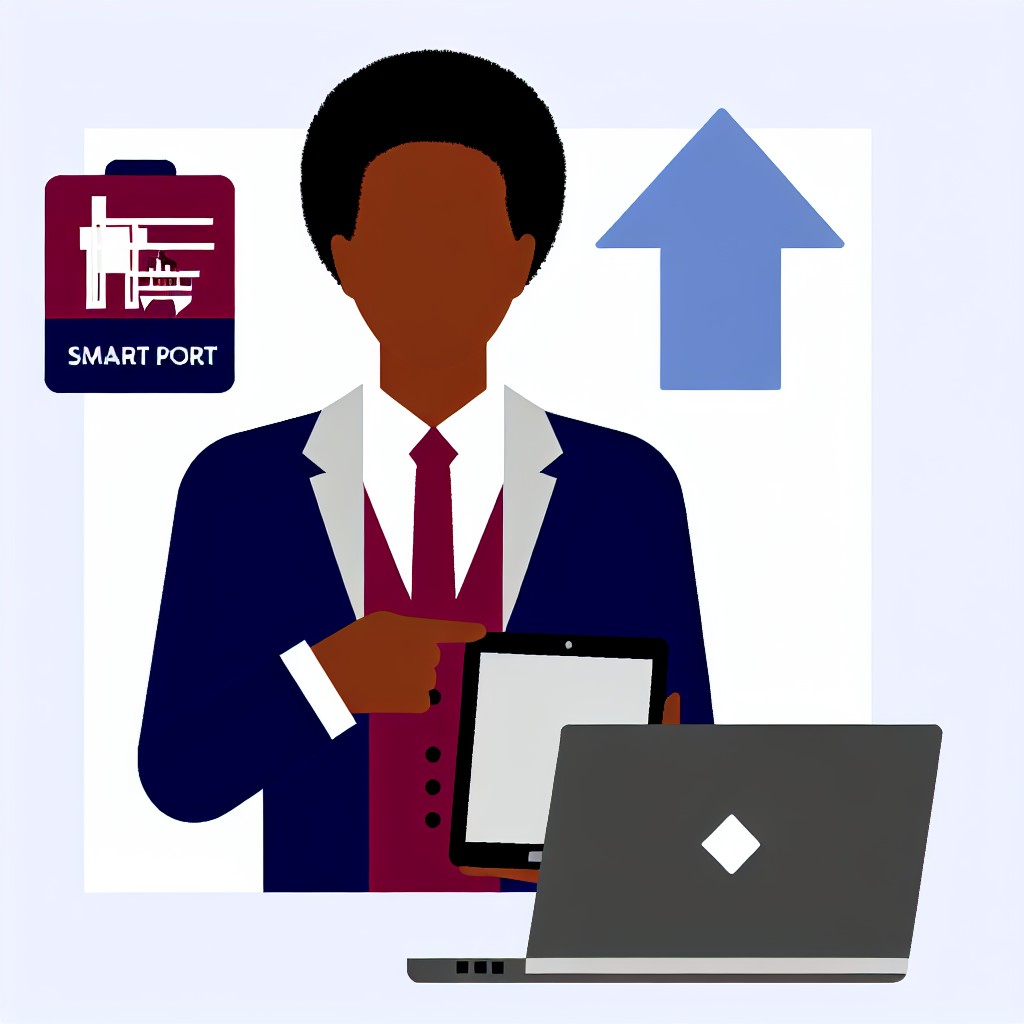Introduction
- Port Operations Managers oversee all activities within a port facility.
- Integrating Smart Port Technology is crucial for optimizing operations efficiency.
Role of Port Operations Manager
Port Operations Managers are responsible for coordinating and managing all aspects of port operations.
This includes overseeing vessel arrivals and departures.
They manage cargo handling and security protocols.
They ensure compliance with regulations.
They play a critical role in ensuring smooth and efficient operations within the port facility.
Importance of Integrating Smart Port Technology
Smart Port Technology refers to the use of advanced digital solutions to enhance port operations.
By integrating smart technologies such as IoT sensors, AI, and data analytics, Port Operations Managers can streamline processes.
This integration helps improve decision-making.
It also increases overall productivity.
This technology allows for real-time monitoring of vessel movements.
Cargo tracking and automated processes become more efficient.
As a result, ports achieve greater efficiency and cost savings.
Furthermore, Smart Port Technology enables ports to become more sustainable.
It helps reduce environmental impact and optimize energy consumption.
By embracing these innovative solutions, Port Operations Managers can lead their facilities into the future of modern port management.
Definition and Responsibilities of a Port Operations Manager
As a Port Operations Manager, you play a crucial role in supervising daily activities at a port.
Your responsibilities are diverse and essential to the port’s efficient functioning.
Some of the key duties include:
- Overseeing vessel arrivals and departures.
- Coordinating cargo loading and unloading operations.
- Ensuring compliance with local, national, and international regulations.
- Managing port infrastructure and facilities.
Role of a Port Operations Manager
Port Operations Managers ensure that all port activities run smoothly and efficiently.
They work closely with various departments to coordinate operations and resolve issues.
Transform Your Career Today
Unlock a personalized career strategy that drives real results. Get tailored advice and a roadmap designed just for you.
Start NowAdditionally, they play a crucial role in maintaining safety and security throughout port operations.
Key Responsibilities of a Port Operations Manager
Overseeing vessel arrivals and departures requires careful management of port traffic.
This involves coordinating ship arrivals and departures, following berthing schedules, and managing delays or issues.
Coordinating cargo loading and unloading operations is essential to the port’s success.
The manager ensures cargo is handled safely and efficiently, including storage and handling requirements.
Ensuring compliance with regulations is a critical task for Port Operations Managers.
They verify that all operations meet safety, environmental, and legal standards on all levels.
Managing port infrastructure and facilities requires overseeing maintenance and resource allocation.
This management guarantees all equipment and facilities remain operational and meet port needs.
The role of a Port Operations Manager is vital to the port’s smooth and effective operation.
By overseeing vessel traffic and cargo operations, ensuring regulation compliance, and managing infrastructure, they help maintain overall efficiency.
Benefits of Smart Port Technology
Smart Port Technology has revolutionized the way port operations are managed.
It offers numerous benefits that enhance efficiency and streamline processes.
Streamlining Operations with Advanced Technologies
One key benefit of Smart Port Technology is the ability to streamline operations at ports.
By integrating technologies such as IoT, AI, and automation, ports can optimize various processes.
Improving Efficiency through Real-Time Data
Smart Port Technology significantly improves efficiency by providing real-time data and insights.
This allows better resource allocation and helps reduce bottlenecks.
Enhancing Visibility with Real-Time Shipment Tracking
Ports can track shipments in real-time using Smart Port Technology.
This improves visibility and transparency throughout the supply chain.
It also enhances security and enables better coordination and planning.
Transform Your Career Today
Unlock a personalized career strategy that drives real results. Get tailored advice and a roadmap designed just for you.
Start NowBenefits of Automation for Port Processes
Automation is a key advantage of Smart Port Technology.
It reduces manual tasks and minimizes human errors.
Automated processes such as container handling and inventory management lead to faster turnaround times.
Empowering Data-Driven Decision Making
Smart Port Technology enables data-driven decision-making by providing actionable insights.
Port managers can make informed decisions that optimize operations and boost growth.
By leveraging advanced technologies and automation, ports can achieve higher efficiency.
They can also improve safety and increase customer satisfaction.
You Might Also Like: Career Advancement Tips for Experienced Seamen
Integration of Smart Port Technology
In today’s digital age, integrating smart port technology is crucial for port operations managers.
They need to stay competitive and efficient by embracing innovative technologies.
Port operations can streamline processes, enhance security, and improve overall efficiency.
This section explores how port operations managers can integrate smart port technology into existing operations.
It also addresses challenges and considerations involved in implementing new technology at ports.
Methods for Integrating Smart Port Technology
- Invest in IoT devices to collect real-time data on port activities.
- Implement a centralized system for data management and analysis.
- Utilize AI and machine learning algorithms for predictive maintenance.
- Adopt blockchain technology for secure and transparent transactions.
- Integrate drones and autonomous vehicles for efficient cargo handling.
Incorporating these technologies allows port operations managers to gain valuable insights.
They can optimize resource allocation and enhance overall efficiency in port operations.
Challenges and Considerations When Implementing New Technology
- Cost implications of investing in new technology.
- Resistance to change from employees.
- Ensuring cybersecurity and data privacy.
- Integration of new technology with existing infrastructure.
- Training employees to use new technology effectively.
Port operations managers must carefully evaluate challenges and considerations before implementing new technology.
By addressing these concerns proactively, they can minimize disruptions and maximize benefits.
Benefits and Future Prospects of Smart Port Technology
The integration of smart port technology offers numerous benefits for port operations managers.
These include improved efficiency, enhanced security, and streamlined processes.
Embracing innovative technologies and addressing challenges effectively allow port operations to thrive digitally.
Transform Your Career Today
Unlock a personalized career strategy that drives real results. Get tailored advice and a roadmap designed just for you.
Start NowYou Might Also Like: Impact of E-commerce on Distribution Management
Case Study: Successful Implementation of Smart Port Technology
Examples of Ports with Successful Integration
- Port of Rotterdam: The largest port in Europe that has embraced Smart Port Technology.
- Port of Singapore: Known for its advanced technology in port operations.
- Port of Los Angeles: Implemented Smart Technology to improve efficiency.
Positive Impacts on Operations, Efficiency, and Sustainability
- Operations: Real-time data leads to better decision-making and enhanced productivity.
- Efficiency: Automated processes reduce human error and speed up operations.
- Sustainability: Smart Port Technology decreases environmental impact through optimized routes.
Smart Port Technology has revolutionized the way ports operate and manage their day-to-day activities.
By integrating cutting-edge technology, ports worldwide have witnessed significant improvements.
These improvements affect operations, efficiency, and sustainability.
The Port of Rotterdam is a prime example of Smart Port Technology implementation.
Rotterdam is the largest port in Europe and has set the benchmark for embracing innovation.
The port incorporates smart technologies such as IoT sensors, AI-driven analytics, and blockchain.
This integration has streamlined processes and improved overall efficiency.
The Port of Singapore is also known for its advanced technological infrastructure.
Singapore leverages Smart Port Technology to optimize its operations effectively.
It implements automated systems for container tracking, predictive maintenance, and intelligent traffic management.
These measures have significantly increased operational efficiency.
The port has reduced vessel turnaround times and enhanced customer experience.
The Port of Los Angeles has also integrated Smart Port Technology successfully.
This port focuses on improving operational efficiency and sustainability simultaneously.
It uses smart sensors to monitor air quality, traffic flow, and energy consumption.
These efforts helped reduce the port’s environmental footprint substantially.
The port also applies AI-powered predictive analytics to optimize the supply chain.
Additionally, it has reduced congestion, resulting in faster vessel turnaround times.
The positive impact of Smart Port Technology on operations cannot be overstated.
Transform Your Career Today
Unlock a personalized career strategy that drives real results. Get tailored advice and a roadmap designed just for you.
Start NowPorts use real-time data and predictive analytics to make informed decisions.
This drives performance improvements across the board.
Automation reduces human error and increases operational efficiency.
Consequently, costs decrease while throughput improves.
The integration of Smart Port Technology also promotes sustainability.
It optimizes energy consumption, reduces emissions, and minimizes waste.
By adopting eco-friendly practices and green technologies, ports contribute to a sustainable maritime industry.
Rotterdam, Singapore, and Los Angeles demonstrate the benefits of embracing innovation.
They harness data, automation, and analytics to optimize processes and enhance efficiency.
Smart Port Technology will play a vital role in shaping the future of port operations worldwide.
Discover More: Port Operations Manager: Managing Port Infrastructure
Importance of Training Port Operations Managers on Smart Port Technology
Understanding new systems and technology is crucial for efficiency.
Proper training ensures smooth integration of smart port technology.
Training reduces errors and enhances decision-making skills.
Port operations managers need to be up-to-date on technology advancements.
- Understanding new systems and technology is crucial for efficiency.
- Proper training ensures smooth integration of smart port technology.
- Training reduces errors and enhances decision-making skills.
- Port operations managers need to be up-to-date on technology advancements.
Ways to Improve Skill Development in the Industry
- Offer specialized training programs on smart port technology.
- Provide hands-on experience with the latest technological tools.
- Encourage continuous learning through workshops and seminars.
- Establish mentorship programs for knowledge transfer among staff.
- Invest in online resources for self-paced learning opportunities.
Find Out More: Day in the Life of a Cargo and Freight Agent

Collaboration with Technology Providers
- Integrating smart port technology requires collaboration with technology providers.
- Technology providers offer the necessary expertise and resources for implementation.
- By partnering with technology vendors, ports can access cutting-edge solutions.
- Collaborating with technology providers ensures access to the latest innovations.
- Choosing the right technology partners is crucial for successful integration.
- Technology providers play a key role in customizing solutions to port operations.
- Collaboration with vendors helps in adopting scalable and flexible technologies.
- Technology providers assist in overcoming challenges and adapting to changing needs.
- Partnerships with technology providers lead to efficient and streamlined operations.
- Working closely with technology vendors enhances the port’s competitiveness in the industry.
Role of Partnerships and Collaborations
- Partnerships are essential for driving innovation and sustainability in port operations.
- Collaborations foster knowledge sharing and best practices among stakeholders.
- Engaging in partnerships enables ports to leverage expertise and resources.
- Partnerships with technology providers lead to cost-effective and efficient solutions.
- Collaborating with vendors helps in addressing specific operational challenges.
- Successful partnerships result in improved productivity and operational efficiency.
- Building strong relationships with technology providers enhances service quality.
- Partnerships play a critical role in future-proofing port operations against technological advancements.
- Collaborations with technology vendors promote a culture of continuous improvement.
- Joint initiatives with technology providers drive advancements in smart port technologies.
Future Trends and Innovations in Smart Port Technology
In today’s rapidly evolving technological landscape, the future of smart port technology holds incredible promise.
Here are some predicted upcoming trends and innovations that will shape the future of port operations.
Autonomous Vehicles and Drones
- Autonomous vehicles and drones are set to revolutionize port operations by enabling faster and more efficient cargo handling.
- These technologies can navigate through ports with precision, reducing human error and improving safety.
Blockchain Technology
- Blockchain technology offers a decentralized and secure way to track and record transactions in real-time.
- By implementing blockchain in port operations, transparency and efficiency can be greatly enhanced.
Internet of Things (IoT)
- The IoT allows for seamless connectivity between devices and systems, enabling real-time monitoring and data analysis.
- By incorporating IoT in smart port technology, ports can optimize workflow and improve decision-making processes.
Artificial Intelligence (AI) and Machine Learning
- AI and machine learning algorithms can analyze vast amounts of data to provide insights and predictive analytics for port operations.
- By harnessing the power of AI, ports can optimize resource allocation and enhance overall efficiency.
Green Technologies
- As sustainability becomes a top priority, ports are increasingly adopting green technologies such as solar energy and electric vehicles.
- By embracing environmentally-friendly solutions, ports can reduce their carbon footprint and improve operational sustainability.
Augmented Reality (AR) and Virtual Reality (VR)
- AR and VR technologies offer immersive experiences that can be utilized for training, maintenance, and logistics planning in ports.
- By integrating AR and VR into smart port technology, ports can enhance training programs and streamline operations.
These advancements in smart port technology have the potential to revolutionize port operations.
They can drive significant improvements in efficiency, productivity, and sustainability.
Transform Your Career Today
Unlock a personalized career strategy that drives real results. Get tailored advice and a roadmap designed just for you.
Start NowBy staying ahead of these trends and innovations, port operations managers can position their ports for success in the rapidly evolving digital age.
Benefits of Integrating Smart Port Technology
Integrating Smart Port Technology is crucial for port operations managers.
This technology enables efficient and effective port management.
It allows real-time monitoring of port activities and assets.
Data analysis helps optimize port performance and decision-making.
Automated processes reduce manual errors and increase operational speed.
Role of Port Operations Managers in Technological Innovation
Embracing Smart Port Technology enhances productivity within port operations.
It also improves safety standards for workers and cargo.
Furthermore, this technology significantly reduces operational costs.
Port operations managers are key drivers of digital transformation initiatives.
They lead innovation efforts to modernize the maritime industry.
Additional Resources
Chapter 3.2 – The Digital Transformation of Ports | Port Economics …
A survey on blockchain technology in the maritime industry …




